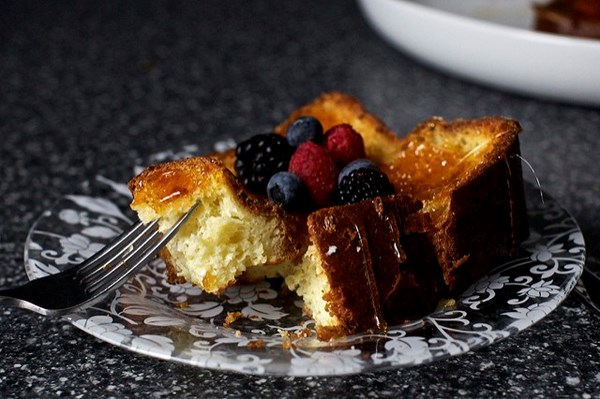When there are too many notes
June 2, 2022 by DarcieThere is a scene in the 1984 movie Amadeus when the Emperor tells Mozart that while his new composition was good, it did suffer from a flaw: there were simply too many notes. My husband feels the same way about recipes. Whenever I rattle off a long recipe title when pitching something I might want to make for dinner, he tells me there are “too many ingredients,” implying that it sounds too complicated. (His limit is three ingredients in a title.)
Take Chocolate-stuffed crème brûlée French toast with whipped cream and berries for example. While I am drawn to sweet foods such as this like a moth to a flame, it does sound as though it might take many steps and a lot of time to complete. And just how much better would it be than regular French toast? There’s a balance to be struck by how much reward you are going to get for the effort you put into making any food, which is my husband’s point. And I must grudgingly admit that sometimes he is right. If the recipe dirties several bowls, pots, and pans and is only marginally more tasty than a simpler dish, it makes sense to veer to the easier version. There are exceptions, of course, when the extra effort pays big dividends in flavor.

Occasionally the title sounds more complicated than the dish actually is. This often happens with recipes where a simple title would sound a bit boring. For instance, Sweet potato soup with lime leaves, beech mushrooms, basil, and peanuts would fail my husband’s litmus test because there are five ingredients in the title. However, this is classified as a quick/easy recipe, and the ingredients listed give the description more pizzazz than just calling it ‘sweet potato soup’. Conversely, a very simple title can also be misleading as to how much effort is involved. To wit: Croissants.
I am wise to the game now, and if I want my husband to be on board I simplify the title of the recipe as I read it to him, being sure to limit it to three ingredients or fewer. This forces me to think about which elements are critical to the dish and allows me to make a reasoned judgment on whether the extra effort will be warranted. I also omit the author’s name when describing the dish, because for certain authors who shall remain nameless (cough, Ottolenghi, cough) my husband will be less enthused because it might (ok, will) mean more cleanup.
Categories
- All Posts (7078)
- Antipasto (2208)
- Author Articles (250)
- Book News (944)
- Cookbook Giveaways (996)
- Cookbook Lovers (262)
- Cooking Tips (116)
- Culinary News (299)
- Food Biz People (558)
- Food Online (800)
- Holidays & Celebrations (277)
- New Cookbooks (154)
- Recipes (1520)
- Shelf Life With Susie (231)
- What's New on EYB (134)
Archives
Latest Comments
- fluffies on For the Love of Lemons by Letitia Clark – Giveaway
- Goulashgirl on Any way you slice it
- ChefClaireFVS on French at Heart – Cookbook Giveaway
- ChefClaireFVS on 20 Amici – 40 Ricette Cookbook Giveaway
- kitchen_chick on Salt Sugar MSG Cookbook Giveaway
- kitchen_chick on Balli Balli – Cookbook Giveaway and Quick Bites
- SCH on Introducing libraries to EYB at ALA
- FrenchCreekBaker on Four outstanding independently published cookbooks worth your attention
- breakthroughc on Any way you slice it
- Marymac54 on French at Heart – Cookbook Giveaway